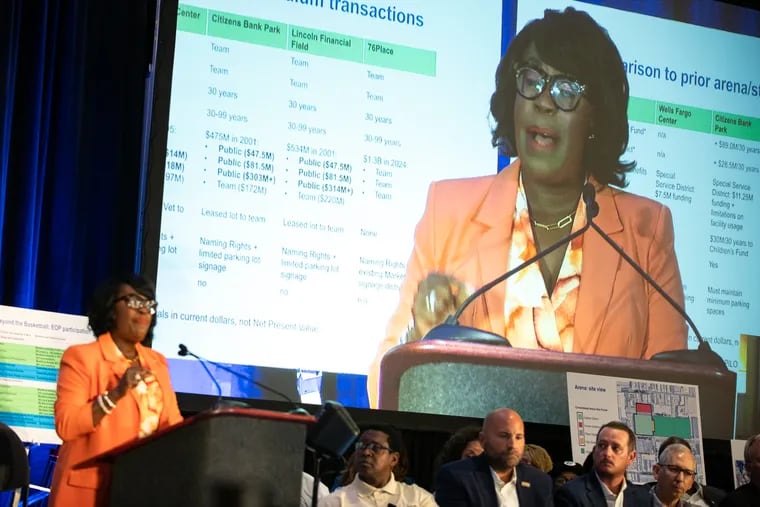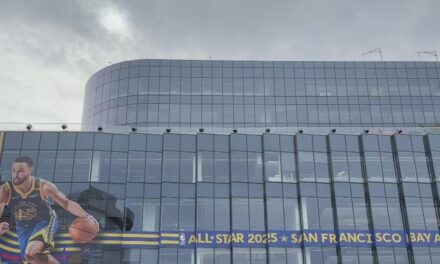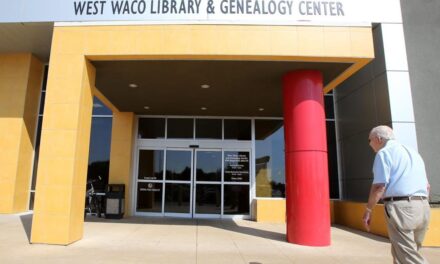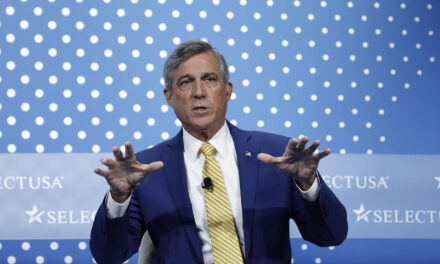/cloudfront-us-east-1.images.arcpublishing.com/pmn/SXAPBUP6YFEEHKCKQRD4HB4EHU.jpg)
Mayor Cherelle L. Parker on Wednesday revealed the terms of the agreement she negotiated with the 76ers for the team’s proposed Center City arena and released drafts of the legislation City Council will need to authorize if the facility is to get built.
“I truly am proud having made this decision and negotiated an agreement,” Parker said, “that will definitely ensure that our Sixers are staying home right here in Philadelphia, where they should be.”
The deal includes an economic opportunity plan to ensure the workforce for the arena’s construction and operations is diverse, a $50 million community benefits agreement meant to blunt the impact of the development on affected neighborhoods, and a provision for the team to make annual payments in lieu of taxes averaging $6 million per year in exchange for not having to pay property taxes.
The administration also released drafts of the nine bills and two resolutions needed to authorize the $1.55 billion project. They include measures that allow the city to acquire the arena property, change the zoning rules and remove an existing Tax Increment Financing arrangement for the site, and authorize large outdoor signage on East Market Street.
As is her practice, Parker unveiled the deal Wednesday evening in a highly choreographed three-hour event, speaking at the Convention Center to a crowd of several hundred that included administration officials, 76ers representatives, and scores of members of the influential construction and service unions that have endorsed the project. Parker said she plans to take the show on the road across the city in the coming months with a series of town halls on the project.
The most visible opposition to the project has come from advocates for Chinatown, who fear it would disrupt or displace residents and businesses. The arena would be built adjacent to the historic Asian American neighborhood, replacing the western third of the Fashion District shopping mall, with a footprint from Market to Filbert Streets and 10th to 11th Streets.
Chinatown leaders said they chose not to attend the mayor’s event Wednesday to show their dissatisfaction with an approval process they believe has not included the views of the community, said Vivian Chang, executive director of the advocacy group Asian Americans United.
”It’s a rushed, haphazard process,” she said. “This is the third last-minute meeting she’s called in as many weeks.”
City Councilmember Mark Squilla, whose district includes the proposed site and who will be the point person for legislation on the proposal, has promised to let the public review drafts of the bills for 30 days before introducing them. During that time, he will gather feedback and may make adjustments before they are officially introduced.
Council’s Oct. 24 meeting is either 29 or 30 days after Wednesday’s announcement, depending on whether the end day is included. Parker said the bills will be transmitted to Council on Oct. 24.
Council’s final session of the year is Dec. 12. Council President Kenyatta Johnson has said it is possible the bills could receive final votes before lawmakers adjourn for the year.
If the project is approved, demolition would begin in 2026, construction would begin in 2028, and the facility would open in time for the 76ers’ 2031-32 season, when the team’s lease at the Wells Fargo Center expires.
Details of negotiations
Parker said she gave her negotiating team a set of principles, including “maximizing the potential citywide impact,” “unlocking the long-overdue redevelopment of Market East,” and “preserving and enhancing Chinatown.”
City officials Wednesday touted various aspects of the deal that they said were unusual for similar arena deals across the country, such as enforceability provisions of the economic opportunity plan and a requirement that the community benefits agreement be transferred to future team owners if Harris Blitzer Sports Entertainment sells the franchise.
But after months of negotiations, it’s not clear that the 76ers agreed to any major financial concessions to the city that were not on the table when the team first proposed the arena during former Mayor Jim Kenney’s administration.
Parker touted the front-loading of money that will be distributed in the community benefits agreement, but the $50 million total is what the team offered when it first pitched the project. Similarly, Parker emphasized that the team is not seeking any local taxpayer subsidies, which is a notable departure from the city’s existing sports facilities but was always part of the 76ers’ plan.
Even the agreement’s provision regarding the arena’s energy efficiency came with a caveat: The team agreed to pursue LEED Gold certification if it is “commercially reasonable” to do so.
Meanwhile, on one of the final sticking points in negotiations — a demand by the 76ers for a “competing facilities” clause that could allow it to get taxpayer support in the future if another arena project receives city support — Parker appears to have caved.
Arena to be built without taxpayer money (with caveats)
Parker and administration officials emphasized that the arena will be built without direct taxpayer support, setting it apart from the existing facilities for Philly’s major sports teams.
But there are caveats. The team will likely save money by making payments in lieu of taxes, an arrangement common for major U.S. sports arenas and stadiums.
» READ MORE: Philly stadium owners don’t pay property taxes. Here’s what that means for the Sixers’ arena proposal.
And the deal includes a provision that could potentially allow the 76ers to get taxpayer money in the future — but only if the city helps fund a competing sports facility during the 30-year life of the deal.
The “competing facilities” provision was one of the final sticking points in the administration’s negotiations with the 76ers, The Inquirer has reported, and it appears Parker capitulated.
The deal would allow the 76ers to receive “proportional benefit” in the future if the city gives another facility’s owners “direct funding, specific kinds of tax incentives, and below-market conveyance of public land outside of the Stadium Complex.”
During the two-year public debate over the arena, the 76ers have been at loggerheads with Wells Fargo Center owner Comcast Spectacor, which also owns the Flyers, and the provision appears specifically crafted to prevent the company from receiving public benefits in the future. It applies only to facilities with 5,000 to 25,000 seats, which would include typical basketball and ice hockey arenas but is much smaller than baseball and football stadiums.
Details of community benefits agreement
About half of the city’s $50 million community benefits agreement with the Sixers will go to affected neighborhoods in the immediate vicinity of the arena, Parker said. The administration said 70% of the $50 million will be spent in the first 10 years of the agreement.
Highlights include:
-
$3 million to start a Chinatown small-business lending fund, with the city looking to raise an additional $10 to $15 million.
-
$1.6 million in grants to businesses disrupted by construction.
-
$2 million for neighborhood-based businesses that want to work in the arena, such as concessionaires.
-
$2 million for neighborhood-based business owners who participate in a development program at Community College of Philadelphia.
-
$4.1 million for new security cameras and lighting around the arena, as well as the creation of a public safety substation for law enforcement.
-
$3 million to incentivize public transit use.
-
$1.25 million to expand PHL Taking Care of Business, a commercial corridor cleaning program championed by Parker.
-
$7 million to support extended-year schooling, another key priority of Parker’s.
When City Council will consider the 76ers arena
Council is likely to dive into the debate over the arena in earnest in the month between the Nov. 5 presidential election and Dec. 5, which under normal Council rules is the deadline for lawmakers to give initial approval to the bills if they are to pass by the end of the year.
Squilla has said the bills will be sent to the Committee of Whole, which includes all 17 members and is convened for major issues. He expects there to be multiple days of hearings, at which the public can testify.
So far, four members have made their positions on the arena clear. Councilmembers Kendra Brooks, Nicolas O’Rourke, and Jeffery “Jay” Young Jr. have come out against the arena as proposed. Councilmember Jimmy Harrity is the only member to publicly endorse it.
But given the political support the 76ers have garnered, many City Hall observers expect a majority of members are quietly supportive of the project and will end up voting for it, barring a public relations disaster between now and December.
Local 32BJ of the Service Employees International Union, the African American Chamber of Commerce, and the Black Clergy of Philadelphia and Vicinity — all key political actors with influence on Council — have endorsed the project. Most importantly, the Philadelphia Building and Construction Trades Council, a deep-pocketed coalition of more than 30 unions that is led by Ryan Boyer and was key to Parker’s victory in last year’s mayoral election, is adamantly in favor of it.
But key political obstacles remain for Parker and the 76ers. Council members are wary of being seen as ignorant to the plight of Chinatown. Comcast Spectator, which stands to lose money if the 76ers move out of the Wells Fargo Center, is still working to oppose the project. And the availability of parking — as potent a political issue as there is in City Hall — remains a major concern.
Parker’s announcement last week that she supports the project does not appear to have halted the opposition’s commitment. On Tuesday night, the Washington Square West Civic Association announced it was against the project, meaning that every neighborhood group that borders the project is opposed to it.
Parker closed by warning opponents of the arena that they will have to answer to her going forward.
”Anyone who has any challenges with what is contained in this agreement, you no longer have the Philadelphia 76ers as the villain here.” she said. “I am Cherelle L. Parker. I am the 100th mayor of the city of Philadelphia. I am proud and take full responsibility for what is included in this agreement.”




